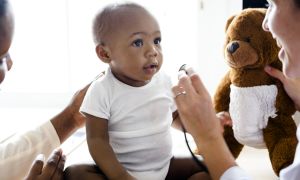Advertisement
Here are some tips for taking care of your three-month-old baby:
- Nursery rhymes serve a purpose: The rhythm, repetition, and rhyme all help with early language development. Talk slowly, vary your tone of voice, and speak lots of mommy or daddy talk. Okay, bubsy wubsy? It not only holds your baby's interest, but actually helps her learn, too.
- During the day, don't forget tummy time, with good supervision. It helps your child develop upper-body strength. She may be able to raise her head and chest now.
- Hand over the maracas. She can shake toys.
- She will be babbling now and may even imitate sounds, so watch the sailor mouth! Well... she won't be making words for a few more months, but you don't want the first one to be "#@#!"
- Don't forget to check water temp at bath time. And never leave your child alone or with a sibling around water.
- Use water-based moisturizing lotion after baths to keep baby's skin soft.
- She may like to see herself in the mirror. A priceless smile indeed. Bonus: Putting a mirror in the crib may keep baby occupied so she won't cry when she wakes up. It's also good for encouraging baby push-ups during tummy time.
- Watch out, because she's on a roll! She may be able to roll from front to back and vice versa. That means no putting the car seat or bouncy seat on the table with her in it or leaving her on a bed or couch unattended -- not even with pillows propped around her.
- Soft toys are great for this age, but beware of ingestible parts (button eyes on stuffed animals, for example).
- Read aloud. And keep doing it. Every day. Cloth or board books with well-defined, boldly colored pictures will hold her attention best.
Continue Learning about Healthy Baby
Important: This content reflects information from various individuals and organizations and may offer alternative or opposing points of view. It should not be used for medical advice, diagnosis or treatment. As always, you should consult with your healthcare provider about your specific health needs.




